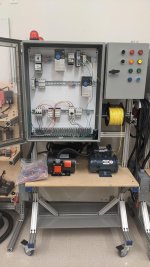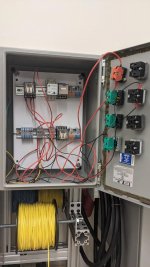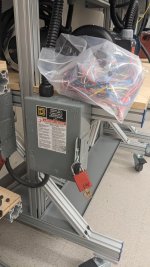tim_callinan
Member
Hello Folks,
I'm an instructor at a community college and have greatly valued the advice I've received from this group in the past. I find myself in need of your expertise once again. My area of instruction is mechatronics, and while I'm comfortable with smaller motors like stepper and servo motors, AC motor control, particularly with high voltages, is not my forte. I'm particularly concerned about ensuring the safety of my students while working with our lab equipment.
I've attached photos of the training setups used by my students, which include VFDs, motor starters, relays, and 3-phase motors housed in cabinets. During labs, students work in pairs on either side of a double-sided trainer to build circuits from schematics I provide, but tests are conducted only under my direct supervision. Our lab is powered by 208V three-phase electricity, and all enclosures are grounded, with disconnect switches and LOTO procedures in place.
However, there are challenges, especially when troubleshooting is needed. Ideally, students would be more involved in this process, but that would require them to work on live cabinets, raising safety concerns. Additionally, there are times I need to use a meter to check circuit voltages.
With this context, I have a few questions:
Is it advisable for me to wear electrical gloves while probing live circuits?
My students need to adjust VFD parameters directly on the control panel, which involves interacting with a live part of the VFD. Is this safe, or are there better practices we should follow?
I would appreciate any safety recommendations you might have after reviewing the photos of our lab setup.
Thank you all for your continued support and guidance over the years. It has been invaluable to me as an instructor.
Best regards,
Tim




I'm an instructor at a community college and have greatly valued the advice I've received from this group in the past. I find myself in need of your expertise once again. My area of instruction is mechatronics, and while I'm comfortable with smaller motors like stepper and servo motors, AC motor control, particularly with high voltages, is not my forte. I'm particularly concerned about ensuring the safety of my students while working with our lab equipment.
I've attached photos of the training setups used by my students, which include VFDs, motor starters, relays, and 3-phase motors housed in cabinets. During labs, students work in pairs on either side of a double-sided trainer to build circuits from schematics I provide, but tests are conducted only under my direct supervision. Our lab is powered by 208V three-phase electricity, and all enclosures are grounded, with disconnect switches and LOTO procedures in place.
However, there are challenges, especially when troubleshooting is needed. Ideally, students would be more involved in this process, but that would require them to work on live cabinets, raising safety concerns. Additionally, there are times I need to use a meter to check circuit voltages.
With this context, I have a few questions:
Is it advisable for me to wear electrical gloves while probing live circuits?
My students need to adjust VFD parameters directly on the control panel, which involves interacting with a live part of the VFD. Is this safe, or are there better practices we should follow?
I would appreciate any safety recommendations you might have after reviewing the photos of our lab setup.
Thank you all for your continued support and guidance over the years. It has been invaluable to me as an instructor.
Best regards,
Tim








